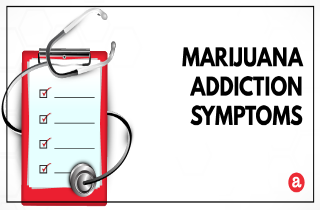Whether a family member, a close friend, a colleague or yourself has a problem with weed, it helps to know how to recognize addiction to marijuana. In this article we outline the most common signs and symptoms of marijuana addiction and review the therapy options. Then, we invite you to post your questions and comments about addiction to marijuana at the end.
Marijuana addiction signs
Being physically dependent on marijuana is not the same as being psychologically addicted to it. Physical dependence has to do with the body, while psychological addiction has to do with the behavior associated with the use of the drug.
A physically dependent person demonstrates a specific set of withdrawal symptoms when levels of THC are drastically reduced or stopped completely. On the other hand, a psychologically addicted person will oftentimes lose self-control if s/he risks drug deficit. Simply, the mind of an addict does not accept a period of abstinence from the drug. A person addicted to marijuana needs weed to cope with daily stresses and/or to avoid psycho-emotional issues.
To recognize a physical dependence, look for the following physical signs:
- disorientation
- dizziness
- drowsiness
- forgetfulness
- impaired learning
- increased appetite (munches)
- laughing without reason
- mood changes
- red, bloodshot eyes
A physically dependent person will also manifest withdrawal symptoms when they stop smoking marijuana completely..or drastically reduce intake. Withdrawal symptoms associated with acute marijuana detox include:
- anxiety
- depression
- drug craving
- headache
- increased aggression
- irritability
- sleeping difficulties
Symptoms of marijuana addiction
In order to address any type of addiction properly, keep in mind that physical dependence is different than psychological addiction. Now, that the distinction between these two is made clear, let’s see what symptoms would give out a person psychologically addicted to marijuana:
- compulsive behavior
- continuous use even when knowing the negative consequences
- cravings and urges when off the drug
- feeling in danger when the supplies are low
- feeling indifferent about work, home, school etc
- inability to quit
- obsessive thinking about how to get marijuana
Do you recognize these symptoms in yourself or someone you know? If yes, do not wait any longer. Talk about it. If you are having a hard time accepting that you are addicted to marijuana, talk to someone close and seek professional help. It can help to anticipate and plan for the treatment options that are available for marijuana addiction.
Marijuana addiction symptoms: Can they be treated?
Yes, marijuana addiction can be treated.
However, the addict has to first accept that s/he has problem with marijuana and next be ready to deal with it. If you are treatment ready and think you can quit on your own, think twice. Have you tried that already? If yes, how many times? The same applies for a person you know and suspect s/he might be an addict. Talk to that person. Ask them if they have tried to quit and how many times. If you cannot stop using marijuana on your own, you may need a more formal or professional intervention. These treatment episodes usually begin with a full assessment, including a physical and psychological survey.
One of the best starting points for seeking help is to consult with a family doctor or a general practitioner. Based on your overall health condition and the level of addiction and/or dependency, a doctor can make a good judgement as to how safe and effective treatment at home may be. A doctor can also prescribe prescription medications or recommend OTC treatment to ease the symptoms. Finally, a doctor can recommend you to different types of treatment programs or resources in your area.
Let’s verify your coverage for treatment at an American Addiction Centers location. Your information is kept 100% confidential.
Typically, marijuana addicts go through the detox stage of treatment (during which THC leaves the body) at the same time they receive other therapies. While detox from marijuana may not be as difficult as detox from opiates or benzodiazepines, assessment and supervision are required during this time. Even tough medications are not usually prescribed during marijuana detox, former addicts may benefit from short term prescription of anti-depressants, for example.
After withdrawal, what follows next includes behavioral and psychological therapy. These types of therapies can take the form of motivational enhancement therapy (MET), group or family therapy, individual cognitive-behavioral therapy (CBT), contingency management (CM) and/or attendance at support groups. The aim of this stage of treatment is to encourage the individual to stay off the drug and deal with cravings, adapt positive thinking and habits. Having the support from close ones and avoiding people who use marijuana is crucial for maintaining abstinence.
Marijuana addiction questions
Do you have questions about the signs and symptoms of marijuana addiction? Do you have experience you’d like to share with others? If there is something specific you would like to ask or share, please contact us in the comments section below. We will try our best to get back to you personally and promptly.










Related Posts